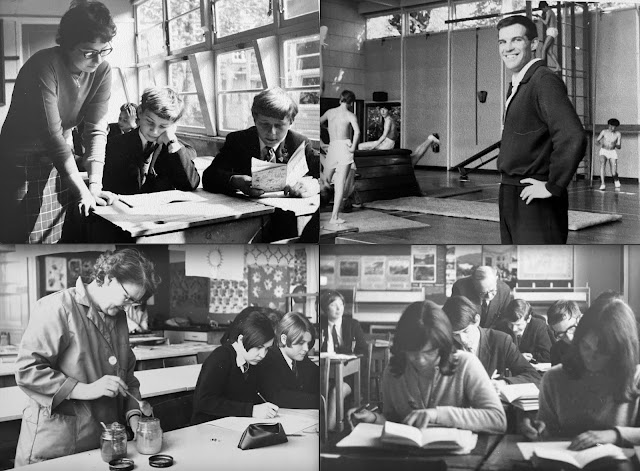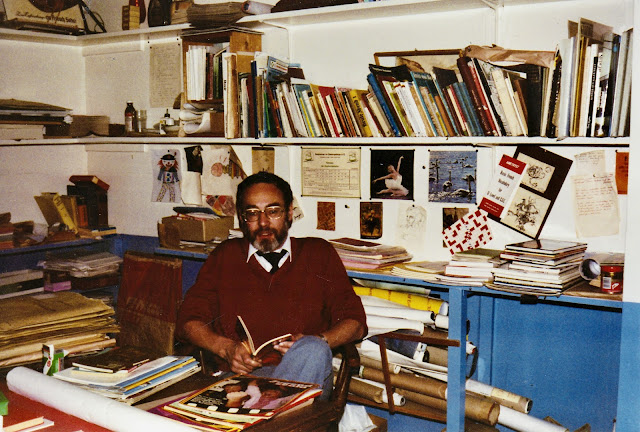1963 and Memories of 1B
Regular visitors to this site might recall that last summer we re-published an article which had appeared in the Evening Gazette back in 1968 describing a disastrous school trip to France. One of the students on the trip, Stephen Willoughby, was interviewed by the Gazette for their report. I'm pleased to say that some fifty plus years later Dr Stephen Willoughby was kind enough to get in touch with us and share his reflections on those remarkable events.
Stephen has also been kind enough to reflect more generally on his time at the Gilberd and so, before we publish his recollections of the holiday, I'm delighted to be able to present this account of his first year at the school in 1963. I am sure Stephen's detailed recollections will bring back a lot of memories for students who were at the school in the 1960s. We're very grateful to him for taking the time to share this with everyone...
Stephen Willoughby is second from the left in the back row
I was one of the September 1963 intake, joining Form 1B which was presided over by Mrs Kathleen Macaulay who was, I imagine, newly qualified. Our form room was in one of the blocks in the Lower School quite near the staff room there. My school reports at that time remind me that Mrs Macaulay taught us RE and English; Mr Yearley, French; Mr Snell, Science; Roy Butcher and Mrs Went, Art; Mr Horlock, Geography; Mr Bateman, woodwork; Dick Osborne, PE and games; Conrad Cole, Music; and others whose names I cannot recall from the initials given in the report.
I remember very well the kitchen which was in the same block adjoining a couple of classrooms which were converted into dining areas at lunchtime; if you happened to have lessons in those rooms for the session before lunch then the aroma of what was to be on the menu was not always inviting! In those days appetites were not dulled by the copious consumption of Potato Puffs (at 3d a bag) and Wagon Wheels (which were huge in comparison to today’s version) bought from the tuck shop run by the caretaker (Mr Munson) a couple of hours earlier.
Some observations about the teachers at the time seen through the eyes of an eleven year old were that most were kind yet firm. Notably, Mr Yearley took to referring to us all by the French equivalent of our names, many of which we carried on using as nicknames for years to come (my friend Paul Henshall was thereafter always know as “Louis”, for example). Mr Yearley also had a “parfait” box which was a repository for a variety of French items such as bus tickets from which pupils who had scored highly in their homework could make a selection as a reward.
Much has been said about Conrad Cole and the fear that we all had of him. The first lesson we had with him was actually quite interesting in which he explained that music touched on just about every aspect of the curriculum, and he challenged us to argue otherwise. Things went rapidly downhill from then on.
Mr Horlock seemed to be on another planet for much of the time; indeed we did discuss our concerns about him with Mrs Macaulay who listened sympathetically and, we felt, with some knowledge of what were talking about. (I was very sorry to hear from Eddie that Mr Horlock had later taken his own life.)
As for games and PE, Dick Osborne was not very tolerant of those who were not naturally athletic; I was often presented to the rest of the class as an example of how not to carry out a particular physical manoeuvre!
Physical activities were prominent on the timetable at that time, with PE in the main hall, games at the site in Sheepen Road near the Technical College, as well as Music and Movement sessions in the Small Hall. M&M involved being “as big as a house” followed immediately by “as small as a mouse” as directed by a pre-recorded (or possibly) live BBC broadcast intoned by a woman who, in earlier times, had probably been a wartime newsreader. I think these sessions were, wisely, dropped by the time we entered the second year.
On the subject of health, we had regular visits from the “nit nurse” who carried out her inspections in the cloakroom area in the lower school. There was always much nervous shuffling in the queue as we awaited our inspection and breathed a sigh of relief when we got the all clear.
The school was well equipped with woodwork and metalwork workshops, a legacy from the days of the Gilberd County Technical School. In our first year we were limited to woodwork under the direction of Mr Bateman who was never seen in anything other than brown overalls. Our first project was to make a small boat, the main skills taught being the use of sandpaper and, more significantly, the creation of a hole in which to fit a length of dowling representing a mast. I soon discovered that woodwork was not one of my natural talents, causing Mr Bateman to comment in his end of year report: “Weak. Finds the subject difficult.” A more advanced project towards the end of the year was to make a foldable stool with fabric stretched over a X-shaped frame. The result did much to confirm Mr Bateman’s assessment of my ability.
I remember that the grassed area on the Lower Paddock had a number of pear trees which during September were laden with fruit (and wasps). In those days the tuck shop’s trade fell off rather as we helped ourselves to the free fruit, and the nurse was fully employed tending to wasp stings. It was made worse because during the first six weeks or so of that school year the boys wore short trousers thereby exposing more flesh to stinging insects. Long trousers had became part of the official school uniform by Christmas.
These were the days of Mr “Sprunt” Sprason and Miss “Twanger” Twyman whom we respected enormously despite what their nicknames might suggest. Miss Twyman appeared to know every pupil by name, together with the names of any of their family members who had ever attended the school. She was renowned also for her rather matronly attitudes: any girl found to be be showing relatively mild affection for a boy was reminded that “holding hands is the first step to having a baby.” I remember her being an excellent teacher. On a few occasions she covered for teachers who were absent, and I remember very well one RE lesson in which she talked for about 45 minutes about the Greek philosophers. It was fascinating.
So much for 1B.
Next: 2A was enriched by many other experiences!





I have since remembered that Mr Snell took us for Science in the lower school lab. Incidentally, he also played violin in the school orchestra until he had a falling out with Conrad Cole during a rehearsal and excused himself. I was there when it happened! (Stephen W)
ReplyDelete